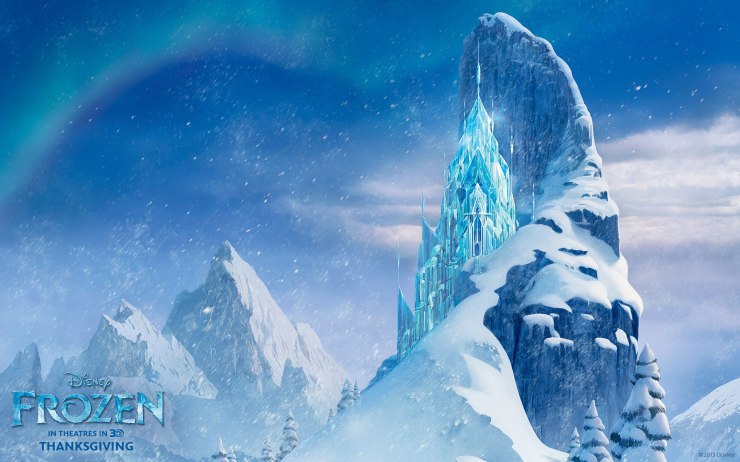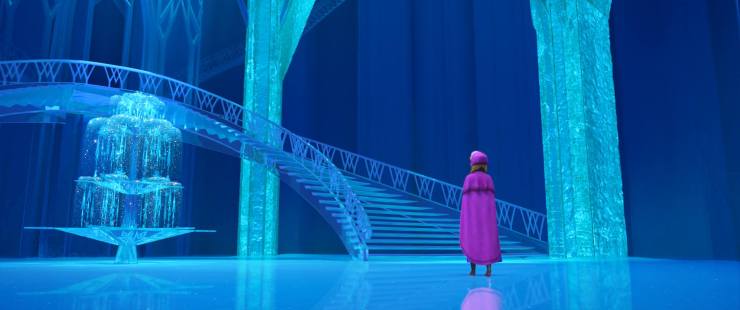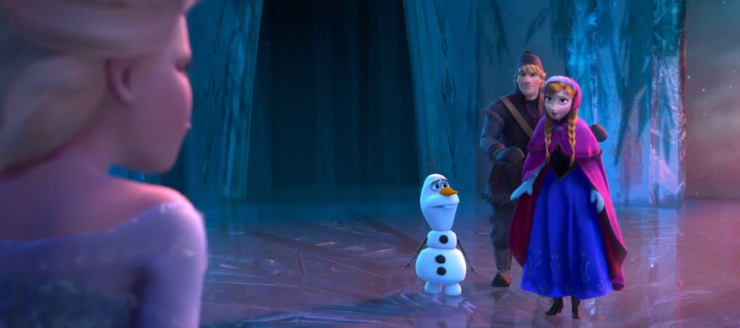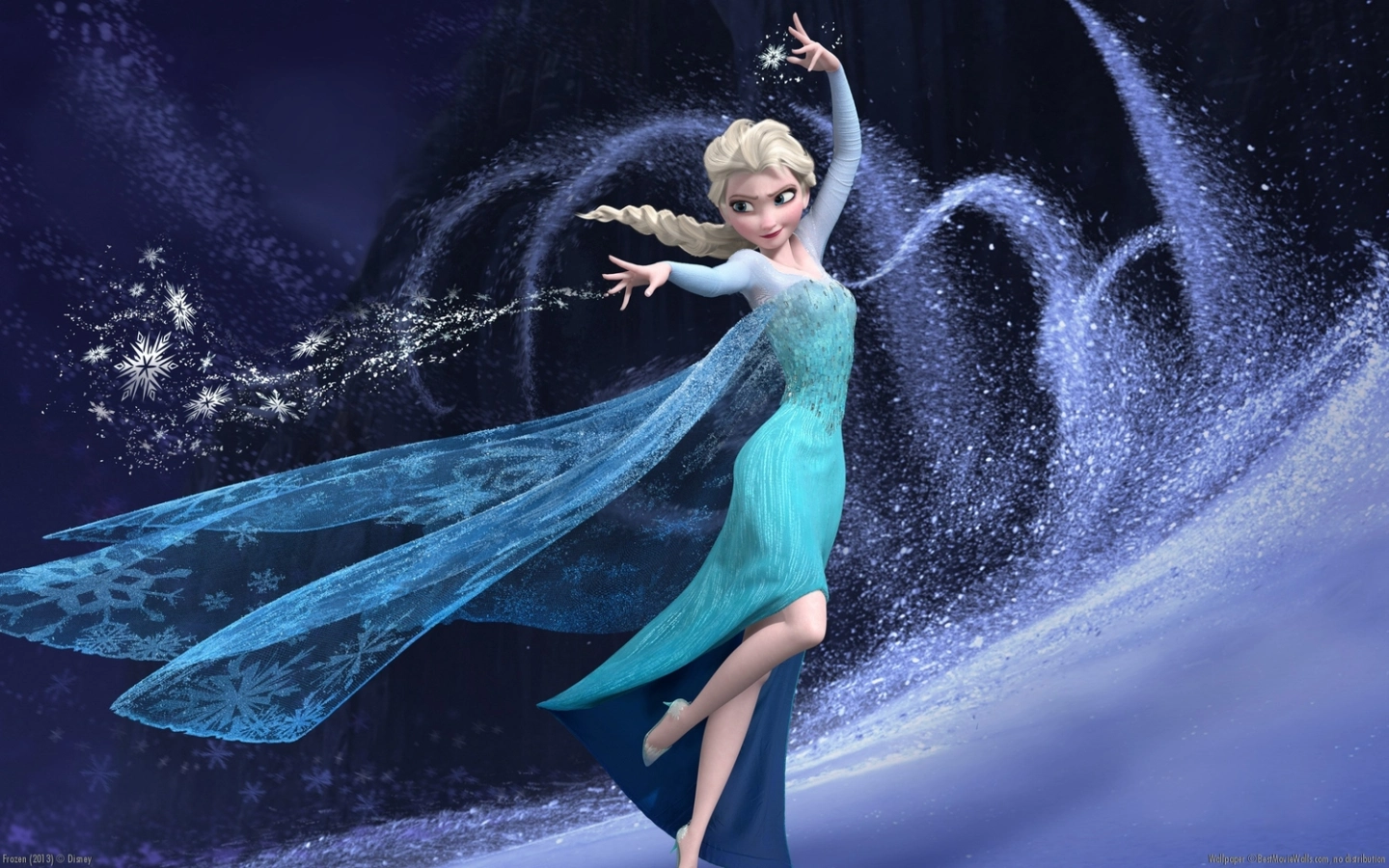Everybody seems to think “Let It Go”, the popular anthem from Disney’s Frozen, is an upbeat, life affirming song. According to Metro Lyrics, the song has a “positive vibe” to it. Everybody, Metro Lyrics included, is wrong.
Let’s recap: Frozen, the latest Disney animated film, sees two royal sisters separated because one, Elsa, has the power to freeze things and cannot control it safely. Elsa’s icy magic puts her sister, Anna, and her kingdom in danger, and she flees into the snowy mountains, living in fear and solitude. The kingdom, cursed by cold, can be saved by true love, which I wrote about earlier.
Elsa sings “Let It Go” after being driven from town by an angry mob when her secret magical powers are revealed. She runs into the mountains, frustrated and afraid, and decides she’s going to stay up there and be the crazy snow queen everyone thinks she is. She takes advantage of her power and builds an empty castle out of ice and lives there, defiantly alone.

Here’s the song’s first chorus:
Let it go, let it goCan’t hold it back any more
Let it go, let it go
Turn away and slam the door
I don’t care what they’re going to say
Let the storm rage on
The cold never bothered me anyway
And here’s what Amanda Hutchison at Metro Lyrics has to say about it:
“It’s a powerful chorus that Elsa sings, letting everybody (including herself) know that she’s finally coming to terms with who she is. We think that when it comes down to it, the overall message of the song, which is letting go of your insecurities in order to reach your full potential, is quite a universal message.”
One thing’s for sure: it’s a powerful chorus. But to understand this song as an ode to personal realisation and wish fulfilment is to take it completely out of context and twist it around 180º.
It’s Elsa’s defining song in her story, and it is anything but positive.
Listening to the song without reference to the film, and reading it only at the most superficial level, yes, maybe you could find a positive vibe in this song. But that’s not how the song is meant to be heard. It’s Elsa’s defining song in her story, and it is anything but positive.
Consider the context again. Elsa has spent her life thus far concealing her powers, fearing the day when she loses control and her secret is discovered. She has shut her sister out of her life and become cold and distant. Now her secret is out and she has run away. She has left her sister behind and hidden herself away in the snowy wastes where no-one will find her.

Instead of dealing with her challenges, she runs from them. Instead of confiding in her sister, she abandons the only one who loves her. This is not positive behaviour; on the contrary, she is lurching from one extreme (concealing herself in public) to another extreme (letting it all out in private). Elsa is merely exchanging one form of isolation for another.
The song is a big F-U to the world that scorned her
Elsa is lonely and angry, a potent combination. She is acting out, like a petulant child storming out of the house after an argument with her family. She’s so consumed by emotion that she won’t be honest with herself about what she must do. And so she sings Let It Go to convince herself that her reckless rebellion is actually OK.
The song is a big F-U to the world that scorned her, a proud declaration that they can all go to hell and she is quite happy to live without them. Ugly selfishness drips from lyrics like “no right or wrong, no rules for me”.
The message of Frozen is that love, family and responsibility are of supreme importance.
It’s easy to get swept up in Elsa’s emotion. We sympathise with Elsa’s plight and we all love a rebel and an underdog. But Elsa is deluding herself. This is not healthy behaviour for her, and the film shows that abundantly. Elsa’s actions only bring further calamity to the kingdom and danger upon herself.

The message of Frozen is that love, family and responsibility are of supreme importance. “Let It Go” is a powerful song and a vital part of the film’s story, but let’s not have any patronising nonsense about “positive vibes”. The song represents the bad attitude of someone who has unfortunately hit rock-bottom; it may be understandable and even sympathetic, but it is ultimately meant to show how Elsa has drifted as far as possible from the true message of the film.
So why is it misinterpreted so egregiously? Partly I think it’s because people aren’t encouraged to engage with media analytically so it’s typical for things to be taken superficially and out-of-context. And partly I think it’s because of the popularity of selfish rebellion.
People are drawn to the idea that they can find everything they need inside themselves and to hell with the world.
Go into any book shop, and you will find the “self-help” shelves packed with front covers telling you to be yourself, reject convention, realise your own identity, and anyone who doesn’t like it can go jump off a cliff. These messages make millions for their authors. People are drawn to the idea that they can find everything they need inside themselves and to hell with the world. It’s a selfish and childish attitude, but people believe in it and when you believe in something it’s easy to twist the world to fit your expectations.
So when Elsa comes along, frustrated and alone, and throws off her cape singing “the cold never bothered me anyway”, the audience smiles and nods, says “you go, girl!”, and listens to the voice inside that says the rest of the world never mattered anyway.


This is so true! I’m so frustrated that no one seems to get that this is Elsa having the WRONG response. Instead every little girl is belting out the song and wanting to look like overtly sexual Elsa.
LikeLiked by 1 person
Thanks for commenting. I’m glad you agree.
LikeLike
I loved this article. Shared it with some of my friends. I’ve been saying this all along to some people, trying to get them to understand. Others agree with me. Elsa is pretty much a B, and society loves her because of that ‘f u’ song and for the fact that she’s sexy and has powers. I feel bad for Anna because more people have embraced Elsa when she didn’t do anything redemptive in the film. She was great when she was a little girl, caring about her older sister, but then she pretty much turned into a B, which was in good portion her parents fault, but she could’ve easily done something about it after they died.
LikeLike
Glad you liked the article. Thanks for commenting.
I wouldn’t go so far as to call Elsa a bitch. I think she’s a sympathetic character who has to deal with an awful situation, and I think many of us would react the way she does at first – by storming off. I think Frozen does show that Elsa learns that storming off doesn’t solve anything and she makes the right choice in the end.
But that certainly doesn’t take away from the fact that “Let It Go” represents a negative attitude and response in the context of the film, and I’m glad that you and a few others have picked up on that.
LikeLike
(I’m sorry for my bad english) I really looking for this kind review. I have the same feeling of this song. Eventhough the song is great and I crazy for it, but in the end I was just realizing that this song is about rebellion… For every passion-blocked people. And the ending message is very good that you can turn everything right with a touch of true love. I wish they made the song for that message :’)
LikeLike
I completely agree with this article and have a strong personal connection with Elsa. It’s merciless hatred. (Until the very, very end where she realizes her mistakes.)
LikeLike
Hey,
I have always thought this about “that song”. She is being an absolute cow at this point, selfish and unloving. Then she goes hurting her sister again, lashing out because she doesn’t like what she hears. Like a tantrumming 4 year old. If we all sang this song and had this attitude when we struggle with our identity and other people’s views, we would all be having one universal bitch fight. I for one would be letting my child fend for himself, my husband would not be able to work, and I would have locked myself in my room indefinitely…yeah handling life well!
x
LikeLike
Absolutely. This always sounded like a Disney “villain song” to me. I think one reason people don’t see it that way is that the style of music isn’t like the kind used for “Be Prepared” or “Poor Unfortunate Souls,” though it did somewhat remind me of “Gaston.” Elsa is an ambiguous character, and she hits her moral low point *during* this song, by throwing the baby out with the bathwater, and interpreting the actions of her parents as a sign that no one will ever be safe with her around. If anything, I think Elsa’s development, over the course of the movie, shows that there’s a right way to express one’s true nature and a wrong way, and all we needed was a post-thaw musical number to really show that off. It’s too bad we didn’t get that. I definitely think, though, that the overall thrust of the movie is against the sentiments expressed in this one musical number. It really makes Elsa look villainous for a while.
LikeLike
Just to clarify, I don’t think Frozen promotes a selfish message. I agree with you, its message about love is very unselfish. Which makes it all the more striking (and ironic) that the scene that most people have latched on to is the one where Elsa hits her lowest point, not the scene where she is redeemed and brings life and love back to her kingdom.
LikeLike
True. They’ve latched onto the selfish villain instead of the redeemed sister.
LikeLike